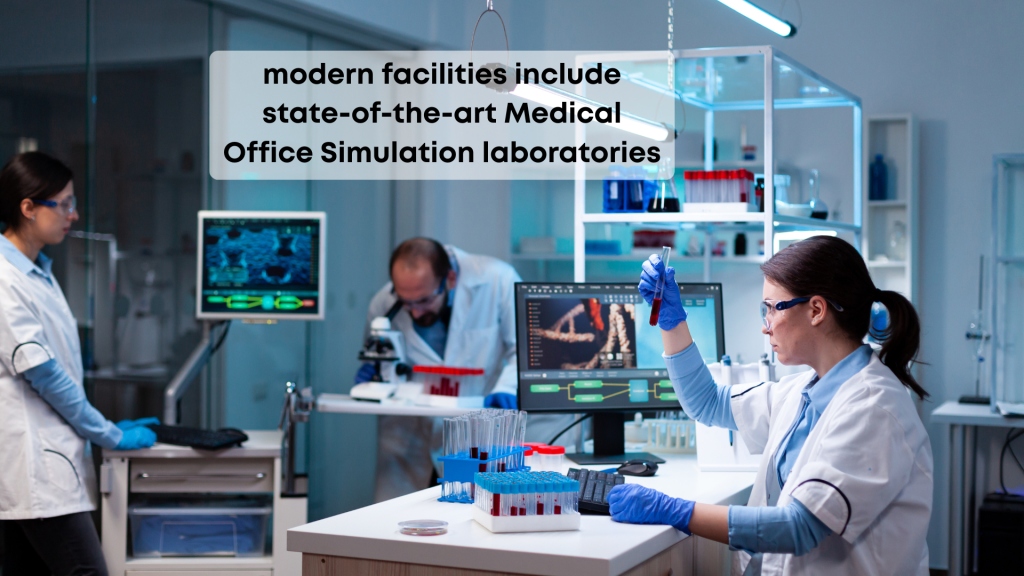At 3:47 AM, the emergency department’s Electronic Health Records system processes its 10,000th patient entry of the month—a digital milestone that would have been impossible just a decade ago. Behind each seamless medical billing transaction, perfectly scheduled appointment, and accurately maintained health record stands a skilled Medical Office Assistant Skills professional who has mastered the complex intersection of healthcare delivery and administrative excellence. This digital transformation has created unprecedented demand for professionals who can navigate both compassionate patient care and sophisticated medical records systems.
The Healthcare Industry’s Unprecedented Growth
Canada’s Healthcare sector is experiencing transformational growth driven by an aging population, technological advancement, and expanding Health Services accessibility. The Ministry of Health projects that demand for qualified medical office administrator professionals will increase by over 15% annually through 2030, making Medical Office Administration one of the most promising career paths in today’s economy. This growth spans diverse healthcare settings including traditional hospital environments, specialized clinics, laboratories, and emerging residential care facility models.
The integration of advanced electronic medical records systems and sophisticated medical billing software has created new professional opportunities that require specialized training and Credential recognition. Modern healthcare industry employers seek professionals who understand both traditional administrative skills and cutting-edge health information management technologies. This combination of skills ensures strong job security and excellent advancement opportunities for qualified Medical Office Assistant professionals.
Digital transformation initiatives across health care organizations have fundamentally changed how Patient Management and health care delivery operate. The implementation of comprehensive Health Records Management Systems requires professionals who understand medical ethics, confidentiality protocols, and complex privacy legislation including Personal Health Information protection requirements. This sophisticated skill set positions Medical Office Administration graduates for leadership roles in the evolving healthcare landscape.
Key Growth Drivers Include:
- Aging population increasing demand for Health Services across all sectors
- Digital transformation requiring expertise in Electronic Health Records management
- Healthcare system expansion creating new clinics and hospital units
- Regulatory compliance needs for Ontario Health Insurance Plan billing systems
- Specialized medical documentation requirements in modern healthcare
- Integration of advanced medical records systems and office equipment technology
Diverse Career Opportunities and Professional Pathways

Graduates of comprehensive Medical Office Administration programs find employment across virtually every segment of the healthcare industry. Traditional opportunities include Medical Secretary positions in family practice clinics, specialized Medical Receptionist roles in surgical centers, and Medical transcriptionist positions supporting medical transcription services. Advanced career paths include medical office coordinator roles, health information management specialists, and hospital unit administration positions that require sophisticated understanding of clinical and office procedures.
Emerging opportunities reflect the healthcare system’s technological evolution, including positions focused on Electronic Health Records implementation, medical billing records analysis, and specialized medical software training coordination. Many graduates pursue roles as Medical Billing Clerk specialists, Booking Clerk coordinators, Ward Secretary professionals, and Clinical Assistant positions that bridge administrative and clinical responsibilities. Medical Office Assistant Skills are increasingly vital in these roles, ensuring efficient healthcare operations and seamless patient care.
The demand for qualified professionals extends beyond traditional healthcare settings to include X-ray Clinics, medical lab facilities, and innovative health care office models that serve specialized patient populations. Professional advancement opportunities include supervisory roles, department management positions, and specialized certifications such as Health Information-Certified Associate and Canadian Certified Administrative Professional designations.
Career Opportunities Include:
- Medical Secretary and Medical Receptionist positions in diverse healthcare settings
- Medical Office Assistant roles in hospital and clinic environments
- Medical transcriptionist and medical documentation specialist positions
- Medical office coordinator and health information management roles
- Medical Billing Clerk and Ontario Medical Insurance Plan specialist positions
- Ward Secretary and Clinical Assistant roles in hospital units
- Booking Clerk and patient relations coordinator positions
Essential Skills and Technical Competencies

Modern Medical Office Administration requires mastery of diverse technical and interpersonal competencies that support efficient health care delivery. Core technical skills include proficiency in Microsoft Office applications, electronic medical record software, and specialized medical software used throughout the healthcare industry. Students develop expertise in medical billing procedures, scheduling systems, and medical document production that meets current Ontario Medical Associations standards.
The curriculum emphasizes Medical Office Assistant Skills such as Medical Terminology mastery, anatomy understanding, and pharmacology knowledge that enables effective communication with healthcare professionals and accurate medical transcription services. Students also develop competency in bookkeeping procedures, insurance practices, and complex billing systems that support healthcare organization sustainability and compliance.
Professional competencies include client service skills, workplace communication techniques, and patient relations capabilities that ensure positive healthcare experiences. Students learn infection control protocols, triage procedures, and emergency response techniques that support safe healthcare environments. Additionally, Keyboarding Speed development and charting accuracy ensure efficient documentation and record-keeping capabilities.
Core Competencies Developed:
- Medical Terminology and anatomy knowledge for accurate communication
- Electronic medical records and medical records systems proficiency
- Medical billing and Ontario Health Insurance Plan billing systems expertise
- Microsoft Office and office administration software mastery
- Medical transcription and medical documentation accuracy
- Client service skills and professional workplace communication
- Confidentiality and privacy legislation compliance understanding
Comprehensive Education and Training Programs
Leading educational institutions offer comprehensive Medical Office Administration programs that combine theoretical knowledge with extensive practical experience. The Health Services Ontario College Diploma and Ontario college certificate programs provide thorough preparation for immediate employment while meeting program outcomes established by health care organizations and professional associations. These programs typically include specialized courses in health services office administration, advanced medical billing techniques, and modern health information management practices.
Field Placement opportunities represent crucial components of professional preparation, providing students with hands-on experience in diverse healthcare settings. Work Integrated Learning placements occur in facilities such as Grand River Hospital, Hamilton General Hospital, and specialized clinics throughout the Region of Waterloo and beyond. These clinical/fieldwork placement experiences allow students to apply classroom knowledge while developing confidence in professional practice.
Advanced training options include capstone course experiences, Medical Office Simulation laboratories, and preparation for National Certification Exam requirements. Students also complete Preplacement Non-Academic Requirements, including background checks and health clearances, ensuring readiness for professional practice in sensitive healthcare environments. The comprehensive approach ensures graduates meet all regulatory requirements while possessing the Medical Office Assistant Skills and competencies that employers value most highly.
Professional Certification and Career Advancement

Professional advancement in Medical Office Administration requires ongoing education and Credential development that demonstrates commitment to excellence and current industry standards. Organizations such as the Canadian College of Health Information, medical secretaries association, and Canadian Red Cross provide specialized certification programs that enhance career prospects and earning potential.
The Canadian Medical Secretary designation and Health Information-Certified Associate certification represent gold standards in the profession, demonstrating advanced competency in health information management and specialized administrative skills. These professional credentials open doors to supervisory positions, specialized departments, and leadership roles within health care organizations.
Continuing education opportunities include specialized training in emerging technologies, advanced medical billing systems, and innovative Patient Management approaches. Many professionals pursue additional certifications in areas such as medical office management, quality curriculum review processes, and healthcare administration leadership that support career advancement and increased responsibility.
Why Choose Central College, Mississauga?
Central College, Mississauga stands at the forefront of Medical Office Administration education, offering a comprehensive Program that combines academic excellence with practical career preparation. Our medical office assistant program benefits from strategic partnerships with leading healthcare settings throughout the Greater Toronto Area, ensuring students gain valuable Work experience in diverse professional environments. Small class sizes enable personalized attention and mentoring relationships that support academic success and professional development.
The college’s modern facilities include state-of-the-art Medical Office Simulation laboratories equipped with current electronic medical record software and office equipment technology used throughout the healthcare industry. Students develop proficiency with industry-standard Microsoft Office applications and specialized medical software while working with equipment that mirrors professional healthcare environments. This hands-on approach ensures graduates are immediately productive upon employment.
Our experienced faculty brings extensive practical experience from diverse healthcare settings including hospital administration, clinic management, and health information management roles. Regular curriculum review processes ensure that course content remains current with evolving industry standards and technological developments. The college maintains strong relationships with Ontario Medical Associations and healthcare employers who provide input on program outcomes and employment requirements.
Central College Advantages:
- Comprehensive Health Services Ontario College Diploma and Certificate programs
- Extensive Field Placement partnerships with leading healthcare organizations
- Modern Medical Office Simulation laboratories with current technology
- Small class sizes ensuring personalized attention and mentoring
- Experienced faculty with extensive healthcare industry backgrounds
- Strategic Mississauga location providing access to diverse healthcare settings
- Comprehensive career services supporting employment and advancement

The college’s commitment to student success extends beyond graduation through comprehensive career services that include job placement assistance, resume development, and interview preparation. Our domestic students and international students benefit from specialized support services including Post-Graduation Work Permit guidance and professional networking opportunities. Campus tours and virtual tour options provide prospective students with detailed insights into our facilities and program offerings.
Flexible learning options accommodate diverse student needs through both in-person components and innovative delivery methods that maintain educational quality while providing accessibility. The college’s sustainability commitment and modern device requirements ensure that students develop proficiency with current technology while preparing for the digital healthcare environments of the future.
Conclusion
Medical Office Administration represents one of Canada’s most promising career paths, offering stability, growth potential, and meaningful contribution to essential Healthcare services. Through comprehensive education that combines theoretical knowledge with extensive practical experience, graduates develop the competencies necessary for immediate success and long-term career advancement. Central College’s Program provides the ideal foundation for entering this dynamic field, offering students the education, training, and professional support necessary to excel as Medical Office Assistant professionals in Canada’s evolving healthcare landscape.
